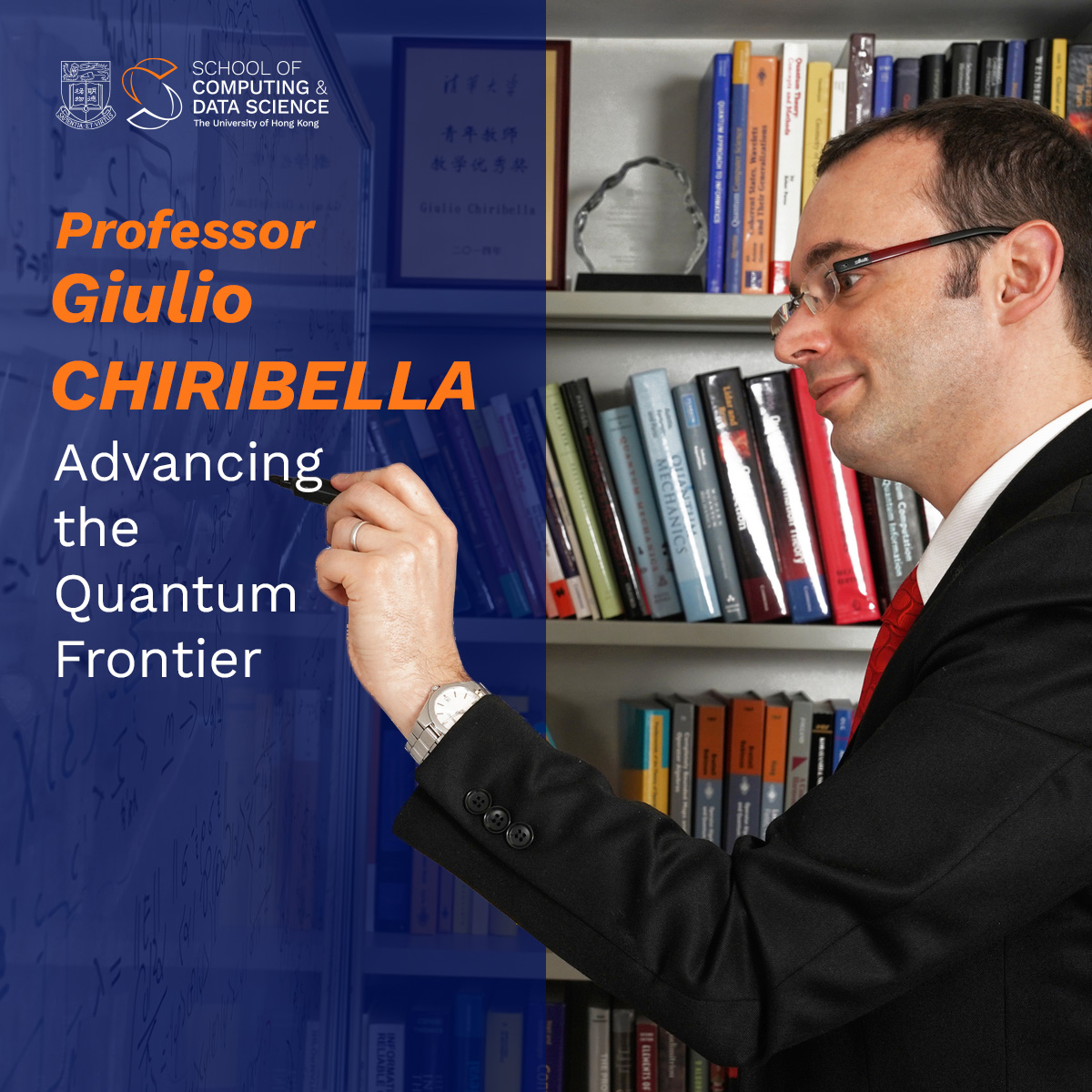
20 Jan 2025
Advancing the Quantum Frontier
Professor Giulio Chiribella is a leading scientist whose work has greatly enriched the emerging field of quantum information science, with breakthroughs in understanding communications and causation at the quantum level.


Professor Giulio Chiribella is a leading scientist in the emerging field of quantum information science. His first encounter with this fascinating field took place in his undergraduate years in the city of Pavia, near his hometown in Italy.
“In the early 2000s, when I was starting my career, the field of quantum information had just started to emerge. I was very excited by the idea of exploiting the counterintuitive features of quantum physics to design new information technologies, such as quantum communication using photons, the elementary particles of light, to carry messages from one place to another,” he said.
Fascinated by the groundbreaking work of pioneers such as Charles Bennett, Gilles Brassard, and Artur Ekert, he found himself drawn to the promising field of quantum information. Luckily for him, one of the first groups in Italy working in this field was right there, at the University of Pavia. Seizing the opportunity, he delved into quantum information for his graduation thesis and then joined the research group there as a PhD student.
This decision marked the start of his academic journey that would lead him to esteemed institutions across the globe, including Perimeter Institute for Theoretical Physics in Canada, Tsinghua University in China, University of Oxford in the UK, and The University of Hong Kong.
His work has greatly enriched the field of quantum information science, with breakthroughs in understanding communications and causation at the quantum level. “One of my early achievements has been to rebuild the whole framework of quantum physics from a new set of basic principles about information. This result gives us a new angle to think about quantum mechanics – to see it as a set of rules that determine how information can be processed in nature,” he said.
Over the past decade at HKU, Professor Chiribella has built up a community of like-minded scholars through the Quantum Information and Computation Initiative (QICI), of which he is Director and which recently set up a joint HKU-Oxford arm. He has also received awards such as the 1000 Talents of China Fellowship, CIFAR-Azrieli Global Scholar (the first scholar in Asia to receive this), Croucher Senior Research Fellowship, and Research Grants Council’s Senior Research Fellowship.
Cause-and-effect direction
Professor Chiribella more recently has focused on cause-and-effect in the quantum world, which takes new forms that are not possible in classical physics.
Taken together, his work has resulted in the development of a new type of communication system where messages can travel simultaneously along multiple paths, thus enhancing the rate of transmission and reducing noise in communication lines.
He and his collaborators have also developed methods to monitor quantum communication lines and estimate their capacity for transmitting information. This has the potential to improve quantum communication networks and enable higher-precision measurements because multiple paths can be probed simultaneously.
“We recently showed that probing a set of optical devices through multiple paths can enhance the precision in the measurement of certain properties of the devices. Our proposal has been demonstrated in the laboratory with photonic systems,” he said. The work was published last year in Nature Physics.
Bringing AI to the quantum level
Professor Chiribella is now trying to further extend causal reasoning in the quantum domain by developing new algorithms to detect and characterise cause-effect relations among quantum systems. This could contribute to the development of new quantum machines that have a built-in ability to reason in terms of causes and effects.
The work could also have implications for artificial intelligence (AI). Professor Chiribella noted that a major future direction in the field is the integration of multiple quantum devices into quantum networks, which could be applied in GPS navigation as well as secure communication, for which China is the world leader.
“The integration of different quantum devices will require AI to be integrated to perform such things as monitoring quantum communication networks and characterising and controlling quantum computers of increasingly larger sizes. Our group is actively engaged in this direction, which we call ‘AI for quantum’,” he said.
“In the longer term, the quantum science community envisions a genuine form of ‘quantum AI’, where neural networks are built on quantum computing hardware.”
Networking with like-minded scientists
Apart from his research, Professor Chiribella is preparing for a major event to be held at HKU in August 2025, the 25th Asian Quantum Information Science Conference, which he will chair. The event will bring together experts in quantum information processing, communication and cryptography.
Early career researchers will also undoubtedly benefit from attending. Professor Chiribella believes that finding a supportive environment and opportunities to interact with other researchers in the field is the main challenge for young scholars. The QICI provides such a forum, with four independent research groups, strong links with other leaders in the field and events such as the conference in August.
Aspiring researchers should also ensure they build a strong foundation in quantum science, he added. “Quantum information is a very large area, covering diverse disciplines from very fundamental to very applied, so once you have a foundation, find the area that best suits your strengths, curiosity and passion. You are the first one who should be enthusiastic about your work and willing to make it shine!”



